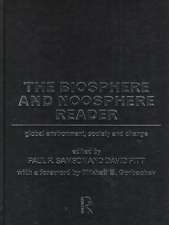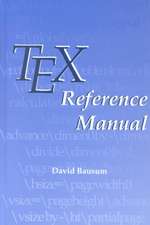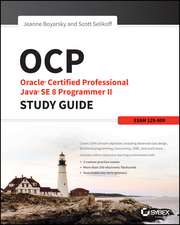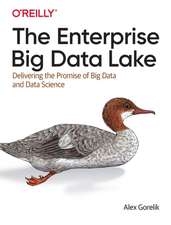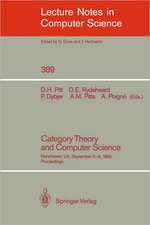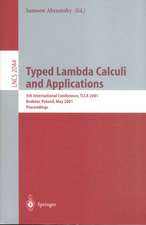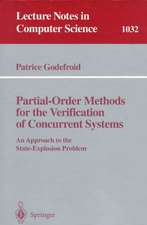Category Theory and Computer Programming: Tutorial and Workshop, Guildford, U.K., September 16 - 20, 1985. Proceedings: Lecture Notes in Computer Science, cartea 240
Editat de David Pitt, Samson Abramsky, Axel Poigne, David Rydehearden Limba Engleză Paperback – oct 1986
Din seria Lecture Notes in Computer Science
- 20%
 Preț: 1061.55 lei
Preț: 1061.55 lei - 20%
 Preț: 307.71 lei
Preț: 307.71 lei - 20%
 Preț: 438.69 lei
Preț: 438.69 lei - 20%
 Preț: 579.30 lei
Preț: 579.30 lei -
 Preț: 410.88 lei
Preț: 410.88 lei - 17%
 Preț: 427.22 lei
Preț: 427.22 lei - 20%
 Preț: 596.46 lei
Preț: 596.46 lei - 15%
 Preț: 448.04 lei
Preț: 448.04 lei - 20%
 Preț: 353.50 lei
Preț: 353.50 lei -
 Preț: 389.49 lei
Preț: 389.49 lei - 20%
 Preț: 309.90 lei
Preț: 309.90 lei - 20%
 Preț: 645.28 lei
Preț: 645.28 lei - 20%
 Preț: 763.23 lei
Preț: 763.23 lei - 15%
 Preț: 580.46 lei
Preț: 580.46 lei - 20%
 Preț: 310.28 lei
Preț: 310.28 lei - 20%
 Preț: 655.02 lei
Preț: 655.02 lei - 20%
 Preț: 1183.14 lei
Preț: 1183.14 lei - 20%
 Preț: 340.32 lei
Preț: 340.32 lei -
 Preț: 449.57 lei
Preț: 449.57 lei - 20%
 Preț: 591.51 lei
Preț: 591.51 lei - 18%
 Preț: 938.83 lei
Preț: 938.83 lei - 20%
 Preț: 337.00 lei
Preț: 337.00 lei - 20%
 Preț: 649.50 lei
Preț: 649.50 lei - 20%
 Preț: 607.40 lei
Preț: 607.40 lei - 20%
 Preț: 1414.79 lei
Preț: 1414.79 lei - 20%
 Preț: 1024.44 lei
Preț: 1024.44 lei - 20%
 Preț: 583.40 lei
Preț: 583.40 lei - 20%
 Preț: 453.32 lei
Preț: 453.32 lei - 20%
 Preț: 575.49 lei
Preț: 575.49 lei - 20%
 Preț: 1075.26 lei
Preț: 1075.26 lei - 20%
 Preț: 585.88 lei
Preț: 585.88 lei - 20%
 Preț: 825.93 lei
Preț: 825.93 lei - 17%
 Preț: 360.20 lei
Preț: 360.20 lei - 20%
 Preț: 763.23 lei
Preț: 763.23 lei - 20%
 Preț: 340.32 lei
Preț: 340.32 lei - 20%
 Preț: 504.58 lei
Preț: 504.58 lei - 20%
 Preț: 369.13 lei
Preț: 369.13 lei - 20%
 Preț: 580.93 lei
Preț: 580.93 lei - 20%
 Preț: 343.62 lei
Preț: 343.62 lei - 20%
 Preț: 350.21 lei
Preț: 350.21 lei - 20%
 Preț: 583.40 lei
Preț: 583.40 lei - 20%
 Preț: 583.40 lei
Preț: 583.40 lei - 15%
 Preț: 438.59 lei
Preț: 438.59 lei - 20%
 Preț: 341.95 lei
Preț: 341.95 lei - 20%
 Preț: 238.01 lei
Preț: 238.01 lei - 20%
 Preț: 538.30 lei
Preț: 538.30 lei
Preț: 343.95 lei
Preț vechi: 429.93 lei
-20% Nou
Puncte Express: 516
Preț estimativ în valută:
65.82€ • 71.47$ • 55.29£
65.82€ • 71.47$ • 55.29£
Carte tipărită la comandă
Livrare economică 22 aprilie-06 mai
Preluare comenzi: 021 569.72.76
Specificații
ISBN-13: 9783540171621
ISBN-10: 3540171622
Pagini: 532
Ilustrații: X, 522 p.
Dimensiuni: 155 x 235 x 28 mm
Greutate: 0.74 kg
Ediția:1986
Editura: Springer Berlin, Heidelberg
Colecția Springer
Seria Lecture Notes in Computer Science
Locul publicării:Berlin, Heidelberg, Germany
ISBN-10: 3540171622
Pagini: 532
Ilustrații: X, 522 p.
Dimensiuni: 155 x 235 x 28 mm
Greutate: 0.74 kg
Ediția:1986
Editura: Springer Berlin, Heidelberg
Colecția Springer
Seria Lecture Notes in Computer Science
Locul publicării:Berlin, Heidelberg, Germany
Public țintă
ResearchCuprins
Categories.- Elements of categorical reasoning : Products and coproducts and some other (co-)limits.- Functors and natural transformations.- Adjunctions.- Cartesian closure — Higher types in categories.- Algebra categorically.- Category theory and logic.- Categories, data types, and imperative languages.- Category theory and programming language semantics: An overview.- Weakest preconditions: Categorical insights.- A categorical view of weakest liberal preconditions.- Functor-category semantics of programming languages and logics.- Finite approximation of spaces.- Categories of partial morphisms and the ?P-calculus.- A note on distributive laws and power domains.- Category theory and models for parallel computation.- Categorical models of process cooperation.- Galois connections and computer science applications.- A study in the foundations of programming methodology: Specifications, institutions, charters and parchments.- Bits and pieces of the theory of institutions.- Extended ML: An institution-independent framework for formal program development.- Behavioural program specification.- Key extensions of abstract data types, final algebras, and database semantics.- Theories as categories.- Internal completeness of categories of domains.- Formalising the network and hierarchical data models — an application of categorical Logic.- A categorical unification algorithm.- Computing with categories.


